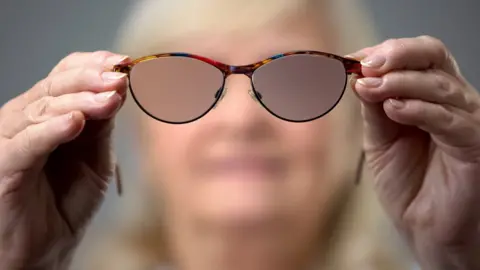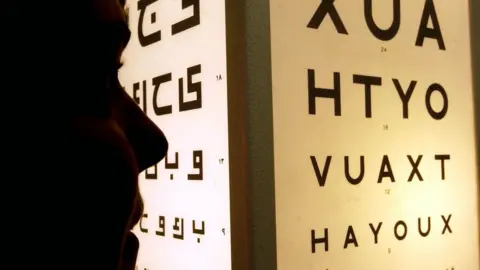Wales Council of the Blind: 'Meaningless' sight test hits claims
 Getty Images
Getty ImagesPeople with sight loss are missing out on benefit payments because of the way their vision is tested, it is claimed.
The Wales Council of the Blind (WCB) said assessors were using specialist equipment incorrectly, leading to false results.
Capita, which assesses Personal Independence Payment (PIP) claimants, said its assessors are "fully trained".
The UK government said assessments only include vision tests where "appropriate and relevant".
But those living with severe sight loss have told BBC Wales Live sight chart tests were done in their home, without distances being measured, or factors like lighting and the standard of peripheral vision being taken into account.
The WCB said PIP assessors are not qualified to carry out such tests, and they should only be done by optometrists or ophthalmologists.
The charity said the tests were "meaningless" and had caused anxiety.
"If somebody has a false reading or their vision has been portrayed as better than it actually is, that may affect their eligibility, or have a negative impact on the eligibility, of their award," explained Owen Williams from the WCB.
"We've got significant evidence that this is happening to a number of people.
"The impact this is having is quite extreme around anxiety emotionally and around peoples' financial security."

"It's knocked me back"

Simone Lloyd, from Maesteg, has a brain tumour on her optic nerve, which cannot be removed.
She has no sight in her right eye, and very little in her left eye.
Simone had her benefits cut by about £200 a month following her PIP assessment.
She is unhappy with the way a sight test was conducted during a home visit and thinks the outcome might have been different if her test had been done by an optometrist in a clinical environment.
"It'd normally be, 'Straight ahead, look at the chart', and the lighting would be different," she said.
"But we were at an angle, she just held a chart up, didn't ask about the lighting or the angle we were at.
"It didn't seem right.
"It's knocked me back, way back.
"I became very depressed, my anxiety was sky high and I felt I had to prove I was worthy and needed the help.

PIP benefits began replacing Disability Living Allowance in 2013.
It is paid to people who have a "long-term health condition or impairment".
There are two parts to the benefit, a daily living allowance and mobility allowance, with upper and lower rates for each.
The minimum payment is £23.20 per week, the maximum is £148.85.
Capita has the contract to carry out assessments for people living in Wales and the Midlands.
Atos assesses people elsewhere.
A Capita spokeswoman said: "Our assessors are fully trained to determine how a partially-sighted person's disability impacts their ability to function.
"We do not seek to reach a diagnosis, and do not make decisions on the level of award given."
 PA
PAA spokesman for the UK government's Department for Work and Pensions said it did not test claimants who are registered as being severely visually impaired, and those with no sight.
"For claimants with some sight the health professional will use any expert evidence that is provided and evidence gathered throughout the assessment," added an official.
"If no expert evidence is provided the assessment may involve a vision test if appropriate and relevant.
"The test would consist of checking near and distance vision using appropriate charts which all assessors are trained to use these."
The UK government said 67% of visually impaired people reassessed when moving from the old disability allowance to PIP "are getting a higher value award as a result".
BBC Wales Live is on BBC One Wales at 22:35 BST on Wednesday - or watch again on the BBC iPlayer
